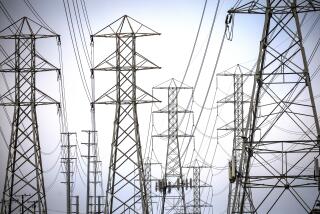Conservation Tips
- Share via
To help reduce electricity demand, the California Energy Commission suggests consumers take the following steps to conserve energy.
At Home
* Turn the thermostat down to 68 degrees or below. Reduce the setting to 55 or lower before retiring or when away for the day.
* Avoid running large appliances, such as washers, dish and clothes dryers and electric ovens.
* Close off vents to rooms that are not being used.
* Turn off all nonessential electrical lights.
* Close shades and blinds to reduce the amount of heat lost through your windows.
* Check your heating ducts to make sure they are properly connected and aren’t leaking air. Studies show that one out of every four homes loses as much as one-third of its heating (or cooling) from bad ducts. Repair them as needed, using approved materials and methods.
* In glass areas, prevent winter heat loss with dual glass panes. Draperies also provide effective insulation, especially those with thermal linings.
* Draw draperies and window shades to limit heat loss. Open them during the day to let sunshine in.
* As much as 18% of your home’s heating loss can be through building openings. Stop this loss by weather-stripping all doors and windows and caulking openings.
* Consider installing a clock thermostat to automatically set back your thermostat at night. Never cover the thermostat with draperies or decorations. Do not put lamps, television sets or appliances that produce heat close to the thermostat.
* If you have a water bed, be sure to make your bed and save as much as one-third of the energy it uses.
* Use bathroom heaters sparingly, if at all.
* Regularly replace or clean filters.
In the Kitchen
* Plan meals that can be cooked together in the oven all at once to make full use of the energy it takes to heat your oven.
* Do not preheat your broiler or range--it only wastes energy.
* Avoid opening the oven door when baking. Taking a peek wastes energy.
* Never use the oven as a room heater.
* Microwave cuisine is faster and more efficient than conventional cooking.
* Learn more about pressure cookers. They prepare foods in two-thirds less time and many people say the final product is more flavorful than conventional cooking.
* Wash only full loads of dishes in your dishwasher. Let the dishes air dry by turning the washer off after the last rinse cycle and opening the door slightly.
At the Office
* Minimize heating by keeping the thermostat at 68 degrees or below.
* Wear comfortable business attire. Dress appropriately for cooler temperatures.
* Turn off any lights that are not needed, especially in unused offices and conference rooms.
* Turn down the remaining lighting levels if you can.
* Turn off your computer if you are out of the office for more than a few minutes.
* Some computers have a “low power standby” mode. Check to see if your computer is set for it.
Source: California Energy Commission


